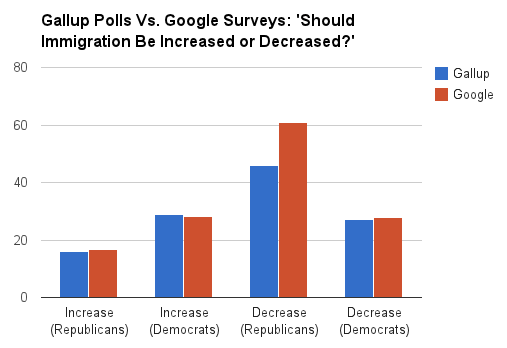Nate Silver and I are big fans of Google’s Consumer Surveys tool. “Perhaps it won’t be long before Google, not Gallup, is the most trusted name in polling,” wrote Silver, on how Google conducted one of the most accurate polls of the 2012 election cycle.
But I didn’t know how useful they’d be for media outlets until I was able to identically replicate a non-election Gallup poll for a fraction of the cost. Last week, Gallup released an important poll on the (relatively) anti-immigration attitudes of Americans, which was one of the best pieces of evidence I had seen demonstrating why immigration reform has been so difficult to pass.
It turns out that no one needed to wait for Gallup or any professional outfit to conduct these very important barometers of public opinion. It took me about 10 minutes to recreate Gallup’s own poll with Google’s Surveys wizard tool.
For the question “In your view, should immigration be kept at its present level, increased, or decreased?”, Google was within a few percentage points for every single answer, except for two (it was off 15 percent for Republicans who wanted to decrease immigration and 12 for Republicans who wanted to keep them at the “present level”).

And, here’s the detailed table
| Gallup | ||
| Increase (Republicans) | 16 | 16 |
| Increase (Democrats) | 29 | 28 |
| Increase (Independent) | 22 | 21 |
| Decrease (Republicans) | 46 | 61 |
| Decrease (Democrats) | 27 | 28 |
| Decrease (Independent) | 35 | 41 |
| Present level (Democrats) | 36 | 38 |
| Present level (Republicans) | 42 | 20 |
| Present level (Independent) | 41 | 34 |
It’s not clear whether Google was wrong for the answer on Republicans. Internet and phone surveys naturally have different responding populations, since the Internet skews younger and the phones skew older (people still have phones?). And some people may have an aversion to saying they want to decrease immigration over the phone, whereas they’re perfectly willing to let their inner xenophobe fly at a faceless computer screen.
There’s still a lot more testing needed to see when Google can replace professional polling operations. But it looks very promising enough to start using it now.
Every journalism school in the country should be teaching students the (very difficult) science of survey methods, so they can all start adding more objective evidence to their stories — because, thanks to Google, all of them have the capacity to be pollsters.
Color this writer excited, more deliciously informative stats to come.
No comments:
Post a Comment